【超详细教程】GoogleTest CMake直接构建(无需安装,手把手教程)
发布时间:2023年12月30日
作者:小猪快跑
基础数学&计算数学,从事优化领域5年+,主要研究方向:MIP求解器、整数规划、随机规划、智能优化算法。
GoogleTest 可帮助您编写更好的 C++ 测试。GoogleTest 是由测试技术团队开发的测试框架,具有 考虑到 Google 的具体要求和限制。无论您从事以下工作 Linux、Windows 或 Mac,如果您编写 C++ 代码,GoogleTest 可以为您提供帮助。它 支持任何类型的测试,而不仅仅是单元测试。
本文将带你快速上手GoogleTest,无需安装到环境,直接用CMake构建。
如有错误,欢迎指正。如有更好的算法,也欢迎交流!!!——@小猪快跑
相关教程
- 【从零开始】在Windows中使用Linux——在WSL使用CLion、IDEA、PyCharm(安装到建立工程)——更新于2021.12
- WSL2 运行 CLion/IDEA/PyCharm等GUI应用——更新于2022.01
相关文献
- google/googletest: GoogleTest - 谷歌测试和模拟框架 (github.com)
- googletest/googletest/README.md at main · google/googletest (github.com)
CMake工程构建
首先打开CLion创建新工程:
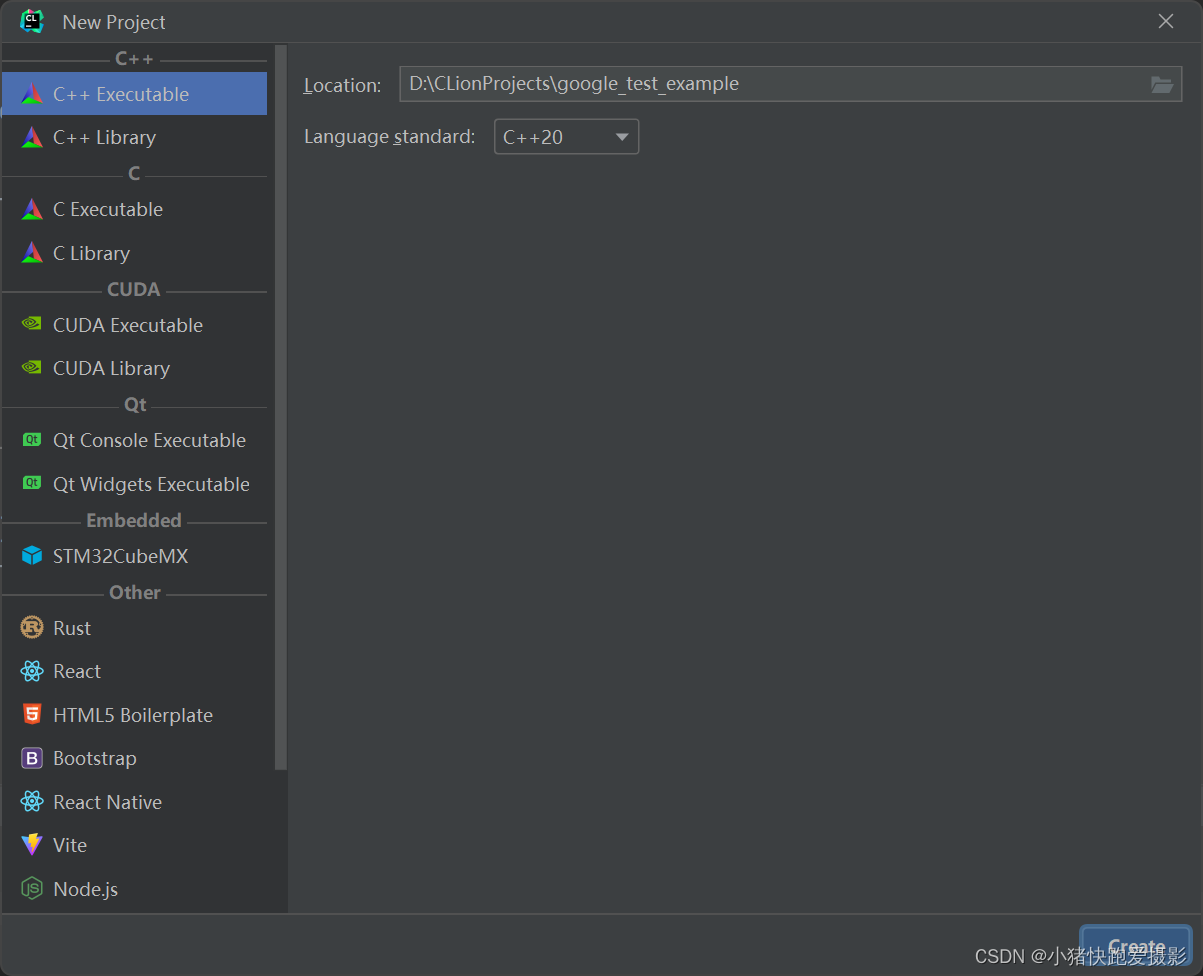
CMakeLists.txt(能访问GitHub)
cmake_minimum_required(VERSION 3.25)
project(google_test_example)
set(CMAKE_CXX_STANDARD 20)
set(PROJECT_ROOT_PATH "${PROJECT_SOURCE_DIR}")
# 可以把gtest打包后的.so文件放进lib目录下
set(LIBRARY_OUTPUT_PATH "${PROJECT_ROOT_PATH}/${OUTDIRS}/lib/")
# 可以把输出文件放进bin目录下
set(EXECUTABLE_OUTPUT_PATH "${PROJECT_ROOT_PATH}/${OUTDIRS}/bin/")
# Build GoogleTest dependencies.
set(BUILD_GoogleTest ON)
include(FetchContent)
# 填充期间的日志输出可能非常冗长,使得配置阶段非常嘈杂。此缓存选项(ON默认情况下)隐藏所有填充输出,除非遇到错误。如果遇到挂起下载的问题,
# 暂时关闭此选项可能有助于诊断导致问题的内容群体。
set(FETCHCONTENT_QUIET OFF)
# 避免每次下载编译及其所有依赖
get_filename_component(_deps "../_deps" REALPATH BASE_DIR "${CMAKE_BINARY_DIR}")
# 在大多数情况下,保存的详细信息没有指定与用于内部子构建、最终源和构建区域的目录相关的任何选项。通常最好将这些决定留给FetchContent 模块来代表项目处理。
# 缓存变量控制收集所有内容填充目录的FETCHCONTENT_BASE_DIR 点,但在大多数情况下,开发人员不需要更改它。
# 默认位置是${CMAKE_BINARY_DIR}/_deps,但如果开发人员更改此值,他们应该致力于保持路径短且刚好低于构建树的顶层,以避免在 Windows 上遇到路径长度问题。
set(FETCHCONTENT_BASE_DIR ${_deps})
# ##############################################################################
# GoogleTest
# ##############################################################################
if (BUILD_GoogleTest)
message(CHECK_START "Fetching GoogleTest")
list(APPEND CMAKE_MESSAGE_INDENT " ")
FetchContent_Declare(
googletest
URL https://github.com/google/googletest/archive/5376968f6948923e2411081fd9372e71a59d8e77.zip
)
FetchContent_MakeAvailable(googletest)
list(POP_BACK CMAKE_MESSAGE_INDENT)
message(CHECK_PASS "fetched")
endif ()
# Now simply link against gtest or gtest_main as needed. Eg
if (BUILD_GoogleTest)
add_executable(example src/sample1.h src/sample1.cc src/sample1_unittest.cc)
target_link_libraries(example gtest_main)
# add_test(NAME example_test COMMAND example)
endif ()
CMakeLists.txt(不能访问GitHub)
提前下载代码【免费】GoogleTest(gtest)资源-CSDN文库
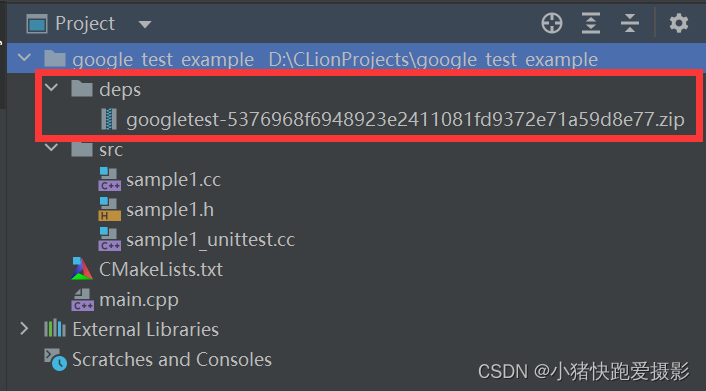
cmake_minimum_required(VERSION 3.25)
project(google_test_example)
set(CMAKE_CXX_STANDARD 20)
set(PROJECT_ROOT_PATH "${PROJECT_SOURCE_DIR}")
# 可以把gtest打包后的.so文件放进lib目录下
set(LIBRARY_OUTPUT_PATH "${PROJECT_ROOT_PATH}/${OUTDIRS}/lib/")
# 可以把输出文件放进bin目录下
set(EXECUTABLE_OUTPUT_PATH "${PROJECT_ROOT_PATH}/${OUTDIRS}/bin/")
# Build GoogleTest dependencies.
set(BUILD_GoogleTest ON)
include(FetchContent)
# 填充期间的日志输出可能非常冗长,使得配置阶段非常嘈杂。此缓存选项(ON默认情况下)隐藏所有填充输出,除非遇到错误。如果遇到挂起下载的问题,
# 暂时关闭此选项可能有助于诊断导致问题的内容群体。
set(FETCHCONTENT_QUIET OFF)
# 避免每次下载编译及其所有依赖
get_filename_component(_deps "../_deps" REALPATH BASE_DIR "${CMAKE_BINARY_DIR}")
# 在大多数情况下,保存的详细信息没有指定与用于内部子构建、最终源和构建区域的目录相关的任何选项。通常最好将这些决定留给FetchContent 模块来代表项目处理。
# 缓存变量控制收集所有内容填充目录的FETCHCONTENT_BASE_DIR 点,但在大多数情况下,开发人员不需要更改它。
# 默认位置是${CMAKE_BINARY_DIR}/_deps,但如果开发人员更改此值,他们应该致力于保持路径短且刚好低于构建树的顶层,以避免在 Windows 上遇到路径长度问题。
set(FETCHCONTENT_BASE_DIR ${_deps})
# ##############################################################################
# GoogleTest
# ##############################################################################
if (BUILD_GoogleTest)
message(CHECK_START "Fetching GoogleTest")
list(APPEND CMAKE_MESSAGE_INDENT " ")
FetchContent_Declare(
googletest
URL "${PROJECT_SOURCE_DIR}/deps/googletest-5376968f6948923e2411081fd9372e71a59d8e77.zip"
)
FetchContent_MakeAvailable(googletest)
list(POP_BACK CMAKE_MESSAGE_INDENT)
message(CHECK_PASS "fetched")
endif ()
# Now simply link against gtest or gtest_main as needed. Eg
if (BUILD_GoogleTest)
add_executable(example src/sample1.h src/sample1.cc src/sample1_unittest.cc)
target_link_libraries(example gtest_main)
# add_test(NAME example_test COMMAND example)
endif ()
官方测试用例
文件目录如下:
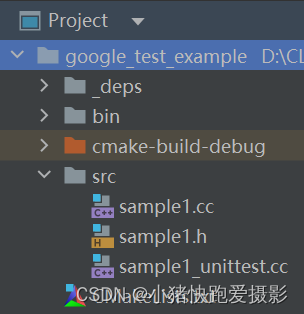
sample1.cc:
// Copyright 2005, Google Inc.
// All rights reserved.
//
// Redistribution and use in source and binary forms, with or without
// modification, are permitted provided that the following conditions are
// met:
//
// * Redistributions of source code must retain the above copyright
// notice, this list of conditions and the following disclaimer.
// * Redistributions in binary form must reproduce the above
// copyright notice, this list of conditions and the following disclaimer
// in the documentation and/or other materials provided with the
// distribution.
// * Neither the name of Google Inc. nor the names of its
// contributors may be used to endorse or promote products derived from
// this software without specific prior written permission.
//
// THIS SOFTWARE IS PROVIDED BY THE COPYRIGHT HOLDERS AND CONTRIBUTORS
// "AS IS" AND ANY EXPRESS OR IMPLIED WARRANTIES, INCLUDING, BUT NOT
// LIMITED TO, THE IMPLIED WARRANTIES OF MERCHANTABILITY AND FITNESS FOR
// A PARTICULAR PURPOSE ARE DISCLAIMED. IN NO EVENT SHALL THE COPYRIGHT
// OWNER OR CONTRIBUTORS BE LIABLE FOR ANY DIRECT, INDIRECT, INCIDENTAL,
// SPECIAL, EXEMPLARY, OR CONSEQUENTIAL DAMAGES (INCLUDING, BUT NOT
// LIMITED TO, PROCUREMENT OF SUBSTITUTE GOODS OR SERVICES; LOSS OF USE,
// DATA, OR PROFITS; OR BUSINESS INTERRUPTION) HOWEVER CAUSED AND ON ANY
// THEORY OF LIABILITY, WHETHER IN CONTRACT, STRICT LIABILITY, OR TORT
// (INCLUDING NEGLIGENCE OR OTHERWISE) ARISING IN ANY WAY OUT OF THE USE
// OF THIS SOFTWARE, EVEN IF ADVISED OF THE POSSIBILITY OF SUCH DAMAGE.
// A sample program demonstrating using Google C++ testing framework.
#include "sample1.h"
// Returns n! (the factorial of n). For negative n, n! is defined to be 1.
int Factorial(int n) {
int result = 1;
for (int i = 1; i <= n; i++) {
result *= i;
}
return result;
}
// Returns true if and only if n is a prime number.
bool IsPrime(int n) {
// Trivial case 1: small numbers
if (n <= 1) return false;
// Trivial case 2: even numbers
if (n % 2 == 0) return n == 2;
// Now, we have that n is odd and n >= 3.
// Try to divide n by every odd number i, starting from 3
for (int i = 3;; i += 2) {
// We only have to try i up to the square root of n
if (i > n / i) break;
// Now, we have i <= n/i < n.
// If n is divisible by i, n is not prime.
if (n % i == 0) return false;
}
// n has no integer factor in the range (1, n), and thus is prime.
return true;
}
sample1.h
// Copyright 2005, Google Inc.
// All rights reserved.
//
// Redistribution and use in source and binary forms, with or without
// modification, are permitted provided that the following conditions are
// met:
//
// * Redistributions of source code must retain the above copyright
// notice, this list of conditions and the following disclaimer.
// * Redistributions in binary form must reproduce the above
// copyright notice, this list of conditions and the following disclaimer
// in the documentation and/or other materials provided with the
// distribution.
// * Neither the name of Google Inc. nor the names of its
// contributors may be used to endorse or promote products derived from
// this software without specific prior written permission.
//
// THIS SOFTWARE IS PROVIDED BY THE COPYRIGHT HOLDERS AND CONTRIBUTORS
// "AS IS" AND ANY EXPRESS OR IMPLIED WARRANTIES, INCLUDING, BUT NOT
// LIMITED TO, THE IMPLIED WARRANTIES OF MERCHANTABILITY AND FITNESS FOR
// A PARTICULAR PURPOSE ARE DISCLAIMED. IN NO EVENT SHALL THE COPYRIGHT
// OWNER OR CONTRIBUTORS BE LIABLE FOR ANY DIRECT, INDIRECT, INCIDENTAL,
// SPECIAL, EXEMPLARY, OR CONSEQUENTIAL DAMAGES (INCLUDING, BUT NOT
// LIMITED TO, PROCUREMENT OF SUBSTITUTE GOODS OR SERVICES; LOSS OF USE,
// DATA, OR PROFITS; OR BUSINESS INTERRUPTION) HOWEVER CAUSED AND ON ANY
// THEORY OF LIABILITY, WHETHER IN CONTRACT, STRICT LIABILITY, OR TORT
// (INCLUDING NEGLIGENCE OR OTHERWISE) ARISING IN ANY WAY OUT OF THE USE
// OF THIS SOFTWARE, EVEN IF ADVISED OF THE POSSIBILITY OF SUCH DAMAGE.
// A sample program demonstrating using Google C++ testing framework.
#ifndef GOOGLETEST_SAMPLES_SAMPLE1_H_
#define GOOGLETEST_SAMPLES_SAMPLE1_H_
// Returns n! (the factorial of n). For negative n, n! is defined to be 1.
int Factorial(int n);
// Returns true if and only if n is a prime number.
bool IsPrime(int n);
#endif // GOOGLETEST_SAMPLES_SAMPLE1_H_
sample1_unittest.cc
// Copyright 2005, Google Inc.
// All rights reserved.
//
// Redistribution and use in source and binary forms, with or without
// modification, are permitted provided that the following conditions are
// met:
//
// * Redistributions of source code must retain the above copyright
// notice, this list of conditions and the following disclaimer.
// * Redistributions in binary form must reproduce the above
// copyright notice, this list of conditions and the following disclaimer
// in the documentation and/or other materials provided with the
// distribution.
// * Neither the name of Google Inc. nor the names of its
// contributors may be used to endorse or promote products derived from
// this software without specific prior written permission.
//
// THIS SOFTWARE IS PROVIDED BY THE COPYRIGHT HOLDERS AND CONTRIBUTORS
// "AS IS" AND ANY EXPRESS OR IMPLIED WARRANTIES, INCLUDING, BUT NOT
// LIMITED TO, THE IMPLIED WARRANTIES OF MERCHANTABILITY AND FITNESS FOR
// A PARTICULAR PURPOSE ARE DISCLAIMED. IN NO EVENT SHALL THE COPYRIGHT
// OWNER OR CONTRIBUTORS BE LIABLE FOR ANY DIRECT, INDIRECT, INCIDENTAL,
// SPECIAL, EXEMPLARY, OR CONSEQUENTIAL DAMAGES (INCLUDING, BUT NOT
// LIMITED TO, PROCUREMENT OF SUBSTITUTE GOODS OR SERVICES; LOSS OF USE,
// DATA, OR PROFITS; OR BUSINESS INTERRUPTION) HOWEVER CAUSED AND ON ANY
// THEORY OF LIABILITY, WHETHER IN CONTRACT, STRICT LIABILITY, OR TORT
// (INCLUDING NEGLIGENCE OR OTHERWISE) ARISING IN ANY WAY OUT OF THE USE
// OF THIS SOFTWARE, EVEN IF ADVISED OF THE POSSIBILITY OF SUCH DAMAGE.
// A sample program demonstrating using Google C++ testing framework.
// This sample shows how to write a simple unit test for a function,
// using Google C++ testing framework.
//
// Writing a unit test using Google C++ testing framework is easy as 1-2-3:
// Step 1. Include necessary header files such that the stuff your
// test logic needs is declared.
//
// Don't forget gtest.h, which declares the testing framework.
#include "sample1.h"
#include <limits.h>
#include "gtest/gtest.h"
namespace {
// Step 2. Use the TEST macro to define your tests.
//
// TEST has two parameters: the test case name and the test name.
// After using the macro, you should define your test logic between a
// pair of braces. You can use a bunch of macros to indicate the
// success or failure of a test. EXPECT_TRUE and EXPECT_EQ are
// examples of such macros. For a complete list, see gtest.h.
//
// <TechnicalDetails>
//
// In Google Test, tests are grouped into test cases. This is how we
// keep test code organized. You should put logically related tests
// into the same test case.
//
// The test case name and the test name should both be valid C++
// identifiers. And you should not use underscore (_) in the names.
//
// Google Test guarantees that each test you define is run exactly
// once, but it makes no guarantee on the order the tests are
// executed. Therefore, you should write your tests in such a way
// that their results don't depend on their order.
//
// </TechnicalDetails>
// Tests Factorial().
// Tests factorial of negative numbers.
TEST(FactorialTest, Negative) {
// This test is named "Negative", and belongs to the "FactorialTest"
// test case.
EXPECT_EQ(1, Factorial(-5));
EXPECT_EQ(1, Factorial(-1));
EXPECT_GT(Factorial(-10), 0);
// <TechnicalDetails>
//
// EXPECT_EQ(expected, actual) is the same as
//
// EXPECT_TRUE((expected) == (actual))
//
// except that it will print both the expected value and the actual
// value when the assertion fails. This is very helpful for
// debugging. Therefore in this case EXPECT_EQ is preferred.
//
// On the other hand, EXPECT_TRUE accepts any Boolean expression,
// and is thus more general.
//
// </TechnicalDetails>
}
// Tests factorial of 0.
TEST(FactorialTest, Zero) { EXPECT_EQ(1, Factorial(0)); }
// Tests factorial of positive numbers.
TEST(FactorialTest, Positive) {
EXPECT_EQ(1, Factorial(1));
EXPECT_EQ(2, Factorial(2));
EXPECT_EQ(6, Factorial(3));
EXPECT_EQ(40320, Factorial(8));
}
// Tests IsPrime()
// Tests negative input.
TEST(IsPrimeTest, Negative) {
// This test belongs to the IsPrimeTest test case.
EXPECT_FALSE(IsPrime(-1));
EXPECT_FALSE(IsPrime(-2));
EXPECT_FALSE(IsPrime(INT_MIN));
}
// Tests some trivial cases.
TEST(IsPrimeTest, Trivial) {
EXPECT_FALSE(IsPrime(0));
EXPECT_FALSE(IsPrime(1));
EXPECT_TRUE(IsPrime(2));
EXPECT_TRUE(IsPrime(3));
}
// Tests positive input.
TEST(IsPrimeTest, Positive) {
EXPECT_FALSE(IsPrime(4));
EXPECT_TRUE(IsPrime(5));
EXPECT_FALSE(IsPrime(6));
EXPECT_TRUE(IsPrime(23));
}
} // namespace
// Step 3. Call RUN_ALL_TESTS() in main().
//
// We do this by linking in src/gtest_main.cc file, which consists of
// a main() function which calls RUN_ALL_TESTS() for us.
//
// This runs all the tests you've defined, prints the result, and
// returns 0 if successful, or 1 otherwise.
//
// Did you notice that we didn't register the tests? The
// RUN_ALL_TESTS() macro magically knows about all the tests we
// defined. Isn't this convenient?
配置
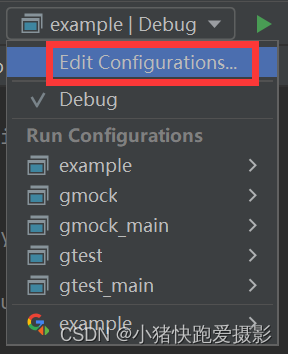
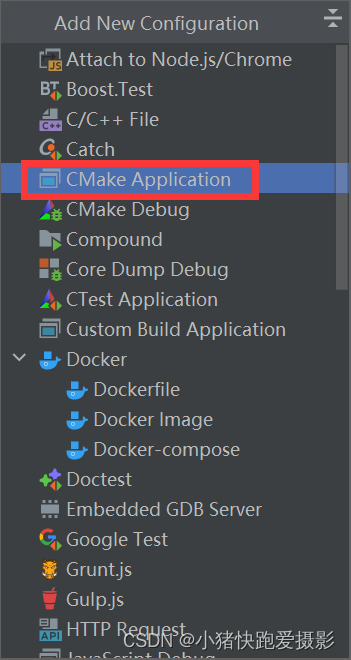
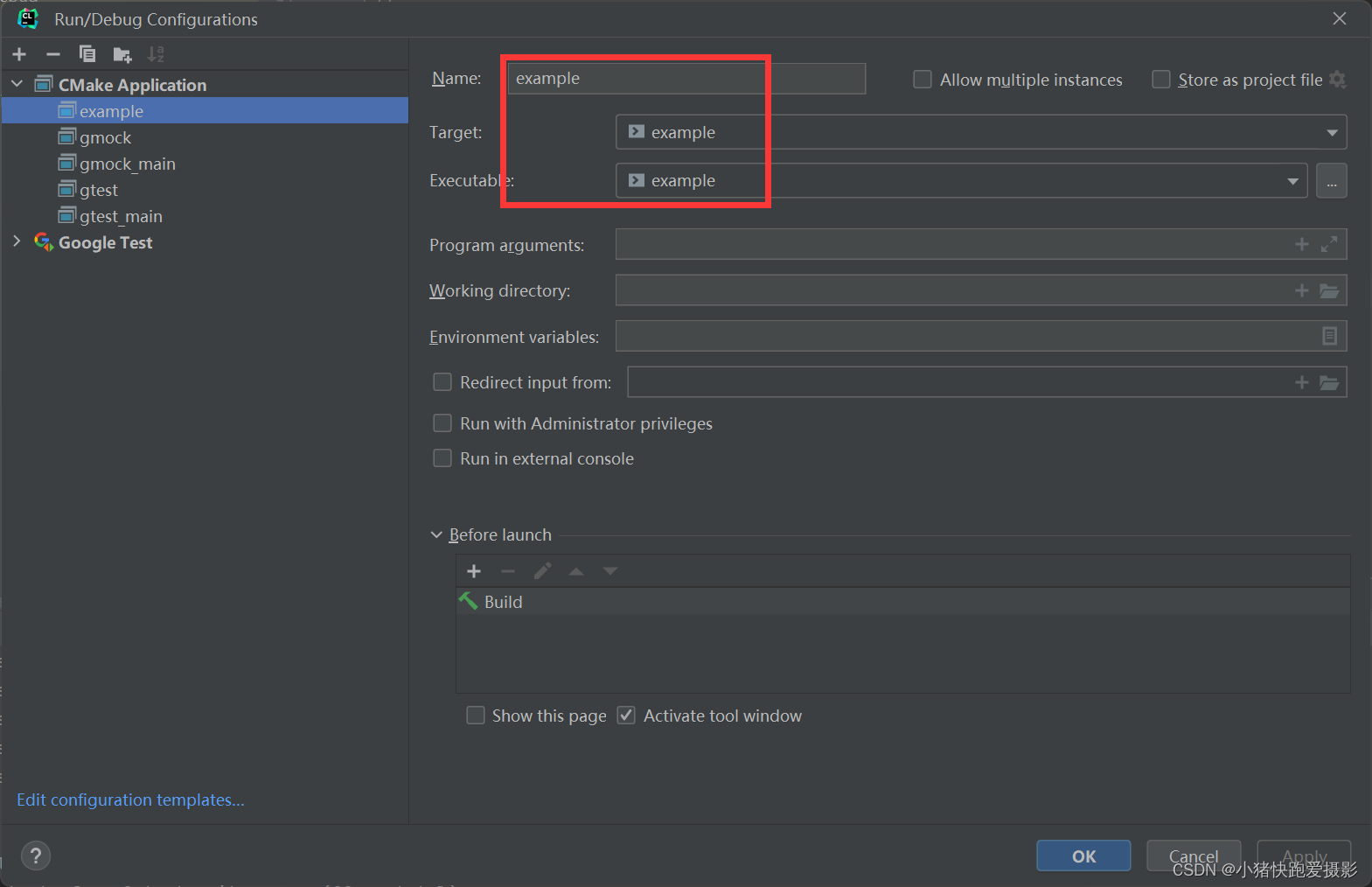

运行后:
D:\CLionProjects\google_test_example\bin\example.exe
Running main() from D:/CLionProjects/google_test_example/_deps/googletest-src/googletest/src/gtest_main.cc
[==========] Running 6 tests from 2 test suites.
[----------] Global test environment set-up.
[----------] 3 tests from FactorialTest
[ RUN ] FactorialTest.Negative
[ OK ] FactorialTest.Negative (0 ms)
[ RUN ] FactorialTest.Zero
[ OK ] FactorialTest.Zero (0 ms)
[ RUN ] FactorialTest.Positive
[ OK ] FactorialTest.Positive (0 ms)
[----------] 3 tests from FactorialTest (6 ms total)
[----------] 3 tests from IsPrimeTest
[ RUN ] IsPrimeTest.Negative
[ OK ] IsPrimeTest.Negative (0 ms)
[ RUN ] IsPrimeTest.Trivial
[ OK ] IsPrimeTest.Trivial (0 ms)
[ RUN ] IsPrimeTest.Positive
[ OK ] IsPrimeTest.Positive (0 ms)
[----------] 3 tests from IsPrimeTest (10 ms total)
[----------] Global test environment tear-down
[==========] 6 tests from 2 test suites ran. (26 ms total)
[ PASSED ] 6 tests.
Process finished with exit code 0
CMake打包gtest.a:
其实通过上述步骤编译后你就会发现多了一个lib目录:
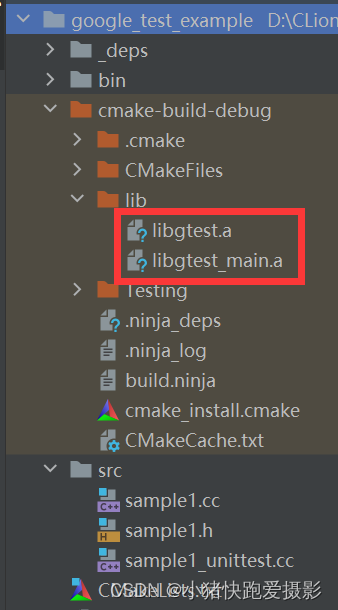
文章来源:https://blog.csdn.net/ymzhu385/article/details/135308269
本文来自互联网用户投稿,该文观点仅代表作者本人,不代表本站立场。本站仅提供信息存储空间服务,不拥有所有权,不承担相关法律责任。 如若内容造成侵权/违法违规/事实不符,请联系我的编程经验分享网邮箱:chenni525@qq.com进行投诉反馈,一经查实,立即删除!
本文来自互联网用户投稿,该文观点仅代表作者本人,不代表本站立场。本站仅提供信息存储空间服务,不拥有所有权,不承担相关法律责任。 如若内容造成侵权/违法违规/事实不符,请联系我的编程经验分享网邮箱:chenni525@qq.com进行投诉反馈,一经查实,立即删除!
最新文章
- Python教程
- 深入理解 MySQL 中的 HAVING 关键字和聚合函数
- Qt之QChar编码(1)
- MyBatis入门基础篇
- 用Python脚本实现FFmpeg批量转换
- 轻松搞懂递归算法
- 禅道安装报错点
- Linux操作系统学习(二)、Linux的文件权限与目录配置
- HCIA-Cloud Computing H13-511题库(61~80)
- 【51单片机系列】proteus中的LCD12864液晶屏
- web渗透安全学习笔记:1、入门基础知识/ XXS漏洞
- 什么是 async、await ?
- 【ECON30001】Advanced Microeconomics
- 拼题A 2024 跨年挑战赛
- 海外问卷使用动态ip和静态ip有哪些优缺点?